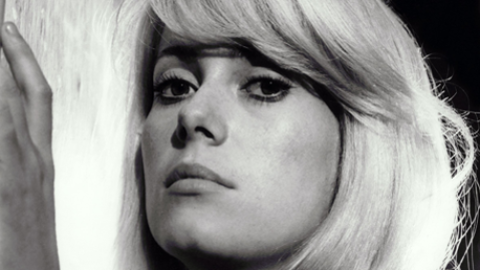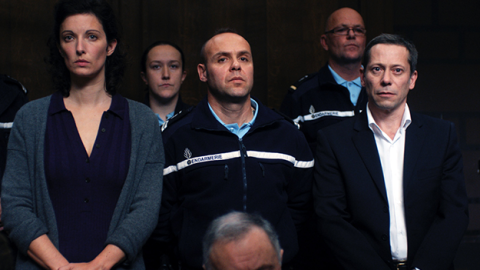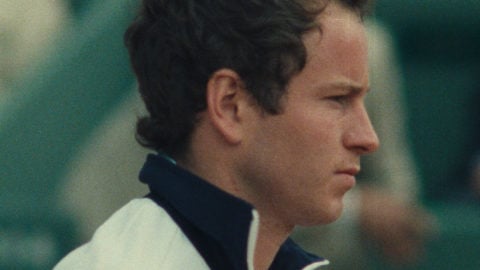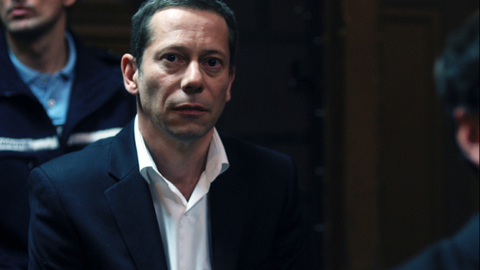Interview: Jeanne Balibar
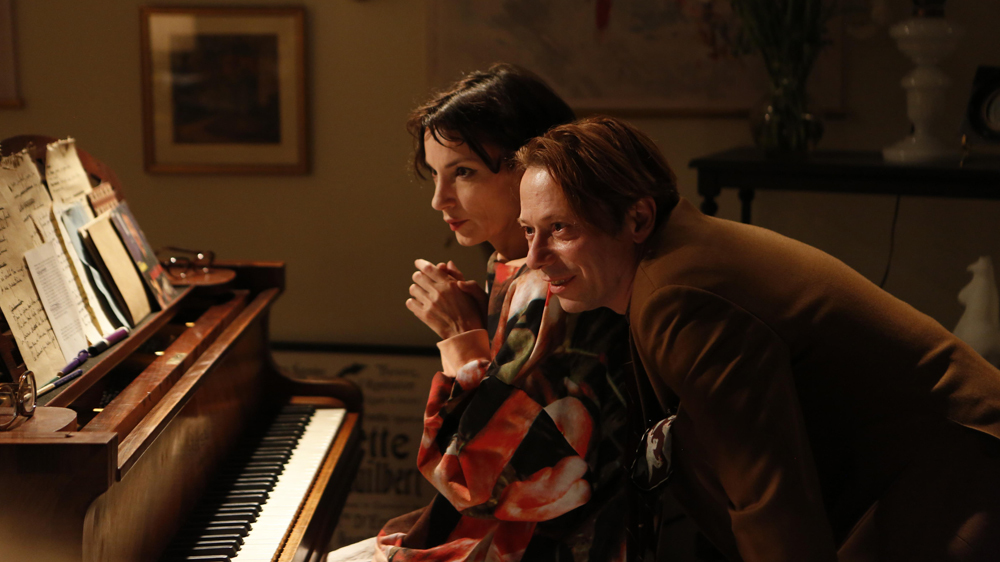
Barbara
Jeanne Balibar appears to be a woman on the run, brilliant and elusive. Originally a student of ballet, and a graduate of the Ecole Normale Supérieure, she was in films by Arnaud Desplechin and Mathieu Amalric early, when they were youngbloods of the 1990s. In Jacques Rivette’s Ne touchez pas la hache (2007), she played Balzac’s charismatic countess opposite Guillaume Depardieu’s bemused General. And as Nastassia in Pierre Léon’s The Idiot (2009), adapted from Dostoyevsky, she was a woman in charge who fires her ex-lovers, ending up triumphant, on her own.
Balibar’s heroines are often women on their own, with hidden agendas—and voices that rise and fall in mysterious octaves. That’s especially the case in Amalric’s Barbara, about the diva who began singing Jacques Brel and Georges Brassens and became a uniquely dramatic figure. Balibar plays an actress preparing to act in a biopic on Barbara, for which she won the 2018 César Award for Best Actress.
Barbara (1930-1997), sang of wartime, exile, love and loss in the age of AIDS. She accompanied herself on piano, echoed by fans who hummed along with her, and somehow became the voice of intimate loss, and post-’68 disillusion. Unlike Piaf, she did not make it to New York, but she did go to Göttingen, Germany, where she sang of reconciliation. And unlike Piaf she was Jewish, and so her songs did not resonate with chiming church bells, but thrummed with darker chords.
Balibar has always been brilliant and quirky, an original who dances to her own tune. She has two sons, now grown, with Amalric, from whom she is separated. In Barbara, he plays discreet director to her Diva with shy glances, bemused smiles in her direction. The daughter of philosopher Etienne Balibar and physicist Françoise, Balibar is perhaps a kind of French Katharine Hepburn, with a whiff of to the manner born, yet thoroughly modern. She dashes rather than walks and has her own voice in the film—a voice that at times merges with that of Barbara.
This autumn, the French Institute Alliance Française (FIAF) and Anthology Film Archives present “Brilliant Quirky: Jeanne Balibar on Film” from September 11 to October 30. I spoke with Balibar in Paris before her visit to New York.
I saw Barbara three times, but I wonder how New York audiences will react ?
The movie worked really well when we showed it during French Film Week in New York, whereas in Germany where they know Barbara, we had less response.
You work a lot in Germany?
I live with Frank Castorf, the theater director, mostly in Berlin. They didn’t pick up Rivette’s Ne touchez pas la hache either.
My favorite of your films, so dense, compressed!
Rivette himself said it was like the compressions that the sculptor César made, like the Awards in his name. He wanted to compress Balzac’s novels!
Let’s situate Barbara for those who adored Piaf who was La France.
Barbara also was La France: we don’t narrate her story in the film, but it’s the story of Jews immigrating from Eastern Europe, from the Ukraine, who went into hiding during wartime and came out in the postwar. And then there’s her way of roaming through the countryside, a restlessness.
Like a nomad?
Yes, she says so herself, a nomad. These were the Mitterrand years, years of AIDS. She visited victims in hospitals and prisons. But she wasn’t as popular as Piaf who is known by all.
Barbara was so special. And then there’s the story with her father, the dying father she comes too late to forgive in her song “Il pleut sur Nantes”? The hidden story of the abuse she suffered.
We found out about her father later. She didn’t talk about what happened back then.
Did Mathieu bring the script to you?
Actually, it was Patrick Godeau, the producer, who called and proposed it to me and asked who I thought could make the film. I had just had a fight with Mathieu, and I was still mad, and didn’t think of him. And then six months later, I was speaking about the project with a friend who said, why not Mathieu? Ah, yes! I proposed the project, and he picked up Pierre Léon’s script and transformed it, did extensive documentation, writing. He made it his.
So you do have a good relationship?
It’s been good for a long time. Sometimes we fight the way people who have kids in common clash. I said I didn’t want to read the different versions of the script—I don’t like reading ahead, I don’t work that way. To prepare, I had to learn to sing and find out how the songs were composed. I thought I could learn more about Barbara through her music, her voice, while he wrote and looked for funding. And then I did something else: I learned the whole script, all the texts by heart, because I wanted to be able to improvise. Barbara had a way of shifting swiftly from one thing to the next. I knew it would be precious during the shoot if I could improvise. We improvised a lot.
You feel it—it’s you and it’s her, and at times we don’t know who’s who, you merge. Did you study singing ?
Not really. I did work with somebody I’ve worked with before, but it wasn’t really like lessons…
I loved the scenes between Barbara and her mother, played by Aurore Clément (who’s also in films by Chantal Akerman and Claude Chabrol). This little mother she mothers.
There’s a kind of improvisation in which I mix what we actually said before in a kind of trance—at one point, she says her mother became her child.
Yes, there’s this mix, a flow between Barbara’s life and the actress’s—the opposite of a biopic.
It was vital for Mathieu and for me—and we didn’t always agree—but we agreed on one thing: that when we make a film, we do not have the right to behave as if we have completely grasped the truth of somebody we don’t know and tell you who that person is. It was beautiful to say we are working on a mystery, not an explanation. And we have to enrich, deepen that mystery instead of searching to solve, elucidate it. Perhaps that’s why the film touched people. We all know mystery—it’s important in our lives.
And the confusion between your voices—that of the actress and that of Barbara’s– gives the film a haunted dimension, a magical confusion. Did you prepare a lot?
Yes and no. In fact I prepared many more songs than ended up in the film. I did that to have an intimate experience. Working on the songs, I saw how fast she sang them. I had to understand why. When you slow down, you see that these songs were so emotional you had to go faster so as not to get bogged down in that sorrow within them.
You aren’t fast?
No, you’ll see when you read me! My sons always tell me to go faster! They’re at the university both studying history.
What about your historians on FIAF’s “Crossing the Line” program? [Balibar will present a special evening in the series.]
I studied history, and love history and stories, the Romanesque side of narration. So we’re presenting three women historians: Anne-Emmanuelle Demartini, Charlotte de Castelnau, and Emmanuelle Loyer. I felt I could build something on their texts, a kind of portrait as well of me and my interests. And I’m editing my film, Merveilles à Monfermeil, a kind of comedy with characters who take extreme and absurd political positions. We did lots of preparation, ateliers in two suburbs with plenty of extras, and now I’m editing. I find I’m so slow.
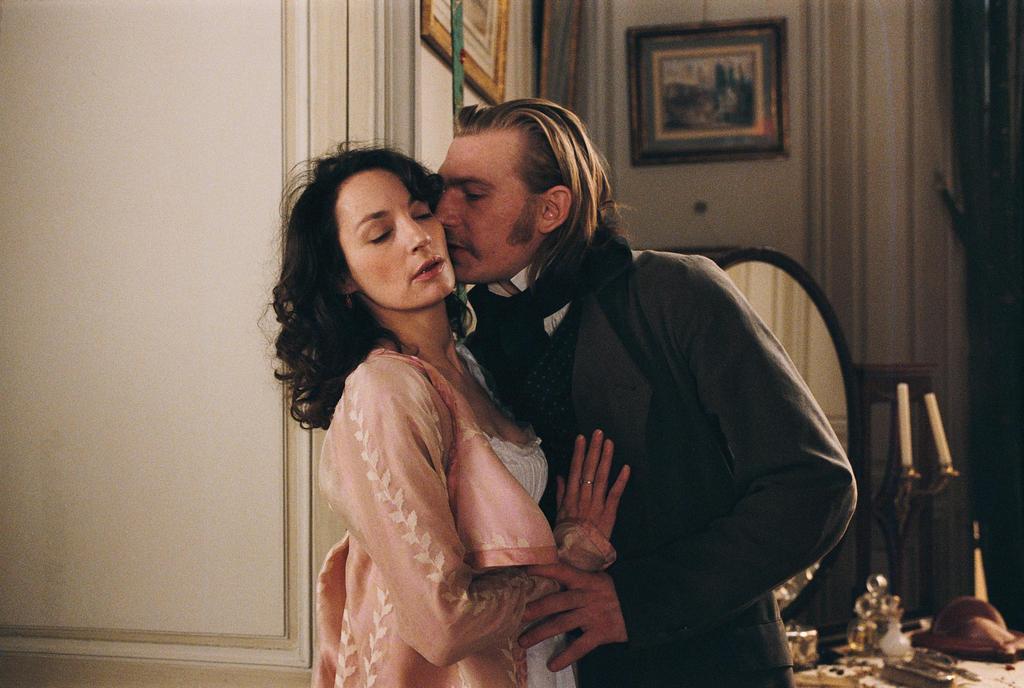
The Duchess of Langeais
Not so slow! I hope that New York audiences can see Rivette’s Balzac and catch the density and dimension of Guillaume Depardieu’s bewitched and bewildered General.
Guillaume was magnificent. What’s fascinating is that all Rivette’s films seem to be made in the period that he shot them, such as Celine and Julie, made in 1968, and Balzac’s Ne touchez pas la hache which somehow resonates: he makes period pieces that speak of the present! In this selection of films, there are several original works that I like, no blockbusters! I really like Raoul Ruiz’s Comédie de l’innocence [2000], with Isabelle Huppert.
You are both terrific in that film as two mothers vying for the same son! How did the two of you work together?
Wonderfully well. Isabelle is not just very intelligent, but also warm—odd because she has the opposite image as an actress. She’s actually very warm. I could never do all that she does, it’s contrary to how I live my life.
So how do you lead your life? What did you think you would do in life?
Like lots of little girls, I thought I’d be a dancer and went to ballet school, danced six hours a day, but at 17 strangely, my body rebelled, it said no to dance! I wanted to meet boys and no longer live as a nun. So I became studious, not intellectual at all—living adventures through literature. I loved narration. Then I fell in love with an Englishman and went to live in England with him. I’ve done that often in my life, leaving to live with a man! We were very young.
I adored living in another language, being myself in another language—it was crucial to me as an actress, to be myself in another’s words. I signed up at Cours Florent without telling anybody because I was a bit ashamed, I felt it was a bit banal to want to be an actress. And from the first day, I got it! I knew this was where I wanted to spend my life! That it was possible, strong, joyous! A revelation! Then I left for the Comédie Française which was not for me—claustrophobic like boarding school!
Adjani also left.
Yes, fast. And Jeanne Moreau. I love and feel good in an ephemeral company—like in the movie world. We can find each other, be together, and lose each other. Because I’m claustrophobic.
Where were you in the world of cinema back then?
It was a time—the ’90s—when the process of making a film went on for months, so I began two films at the same time: Desplechin’s Comment je me suis disputé [My Sex Life… or How I Got into an Argument, 1996] and Bruno Podalydès’ Dieu seul me voit [Only God Sees Me, 1998]—the films weren’t released at the same time.
You were a group of friends?
It was more a generation than a group of friends: I knew Bruno Podalydès through his brother Denis in 1993-94. It all took place at the same time.
And Mathieu? You met him at the same time?
Also at the same time. Our first son was born in 1997. I had a small part in Mange ta soupe [1997]. What counted was the couple.
The couple?
Mother-son—all Mathieu’s films are on the mother-son couple. Even Barbara!
I found Mange ta soupe fascinating, but yes, it was all about him and his mother! Is it okay with her?
Yes, she’s proud, like the Jewish joke: “My son pays somebody twice a week to talk about me!” I grew up in a family of all girls, and have boys so I don’t know that dynamic.
Any regrets about missing a director like Marguerite Duras?
I played in Duras on stage [Le Square]. But I mostly regret that I never took up offers to act in popular movies because I think I have it in me. There’s an actress like that—a Micheline Presle, an Alice Sapritch—in me. But I didn’t follow through. I developed a literary side, but that Boulevard side wasn’t developed, and it’s a shame. Because I’ve always felt I had it in me…



